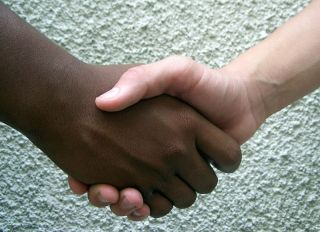Race and Ethnicity
What Race Is Rachel Dolezal?
Disentangling biology and culture to understand Rachel Dolezal’s race.
Posted July 16, 2015

One of the main themes of this blog is the attempt to disentangle issues of biology and culture to better understand the concept of race. Occasionally, a racially charged media uproar creates an opportunity to clarify some issues. Previously, I discussed the question, What Race Is George Zimmerman?; this time I am asking, What Race Is Rachel Dolezal?
***
A story about Rachel Dolezal, leading her to resign as President of the Spokane, Washington NAACP, asserts that she falsely claimed that she is black for years; and she was even investigated for potential criminal prosecution.
I would like to focus on a central element of this complex story—Ms. Dolezal’s racial identity. In my book The Myth of Race, I attempted to disentangle human biological variation from the cultural concept of race. These two distinct conceptual domains are often confused (as I believe they are here) and such confusions can lead to mental distress and social conflict.
The following are what appear to be some relevant facts in this evolving story. (I will use “black” and “white” as American racial terms, and words like “African American” and “European American” as American ethnic terms.)
1. Both of Ms. Dolezal’s biological parents are of European descent, with some Native American but no African ancestors.
2. Her parents adopted four black children, so she has had the experience of living with black siblings.
3. She is an artist, and has an MFA from Howard University, a predominantly black institution.
4. Her ex-husband is black; and she has a son from that union.
5. (a) Several years ago, she became the guardian of one of her adopted black brothers; and various charges and denials of sexual abuse within her family of origin have possibly led to
(b) her parents telling the media that she is white, and
(c) her referring to a black man, to whom she is not biologically related, as her father.
All of these elements suggest intense familial conflict and Ms. Dolezal’s estrangement from her white parents.
6. She considers herself African American, and portrays herself as black. She has concealed her lack of African ancestry, much as people who “pass for white” conceal the presence of such ancestry.
7. As with people who “pass for white,” publicly maintaining her chosen identity has led her to make a number of misleading and false statements about herself and her background.
Because Americans believe that the folk concept of “race” is explained by the folk concept of “blood” (= ancestry), anyone without known African ancestry cannot be black (the one-drop rule). Therefore, Ms. Dolezal is a liar, and is not “really black.”
A key problem here is the assumption that a person’s race—assumed in the United States to be a biological fact—can be objectively determined by examining his or her ancestry.
Other cultures have very different concepts of race. In Brazil you are what you look like; and because people look a lot of different ways, they have a lot of different racial terms. For example, a study by the Instituto Brasileiro de Geografia e Estatística (the entity responsible for the census) asked people what color they are and received 134 different answers.
Brazilians complain that Americans are racist, and one obvious proof (to them) is that we call people black who are not black. In Brazil it is impossible to pass for white or black or anything else, because you are what you look like, regardless of what your parents or ancestors look like.
Ms. Dolezal’s predicament is similar to that of transsexuals whose gender identity does not correspond to what their body looks like. Because our culture doesn't have a category for a woman with a penis or a man with a vagina, we force such people underground. Things have improved for transsexuals, but many men and women still do not accept them, and are even angered or revolted by them. This is not, however, an argument against tolerance.
In a similar way, our culture doesn’t have a category for black people with no African ancestry, and forces them underground. Many blacks, whites, and others do not accept such individuals, and are even angered or revolted by them. But this, too, is not an argument against tolerance.
The uproar that has surrounded revelations about Ms. Dolezal has produced some truly strange bedfellows and odd arguments. Blacks and whites, liberals and conservatives, have raised their voices in defense of the one-drop rule, and against the notion that individuals should be free to choose their own identity—religious, political, ethnic, racial, gender—whatever.
Some people rationalize their intolerance by saying that they are upset not by her choice of racial identity, but by her lying. Given the reaction to a white woman in America claiming to be black, it is not surprising that she chose to lie. But one is entitled to ask—among those who feel entitled to cast the first stone—whether they have ever, in the course of personal, business, sexual, or other social interactions, minimized, concealed, or falsified their own personal data in order to achieve some personal advantage. And do they really want to defend the one-drop rule, a principle that has caused much grief for African Americans for centuries?
Let’s give Rachel Dolezal a break. Now that she has come out of the closet, let us accept her declaration that she is black: an African American woman with no black blood.
Image Source:
Rufino Uribe: Hermandad - friendship
Wikimedia Commons
bit.ly/1MuL6s7
Check out my most recent book, The Myth of Race, which debunks common misconceptions, as well as my other books at http://amazon.com/Jefferson-M.-Fish/e/B001H6NFUI
The Myth of Race is available on Amazon http://amzn.to/10ykaRU and Barnes & Noble http://bit.ly/XPbB6E
Friend/Like me on Facebook: http://www.facebook.com/JeffersonFishAuthor
Follow me on Twitter: www.twitter.com/@jeffersonfish
Visit my website: www.jeffersonfish.com




